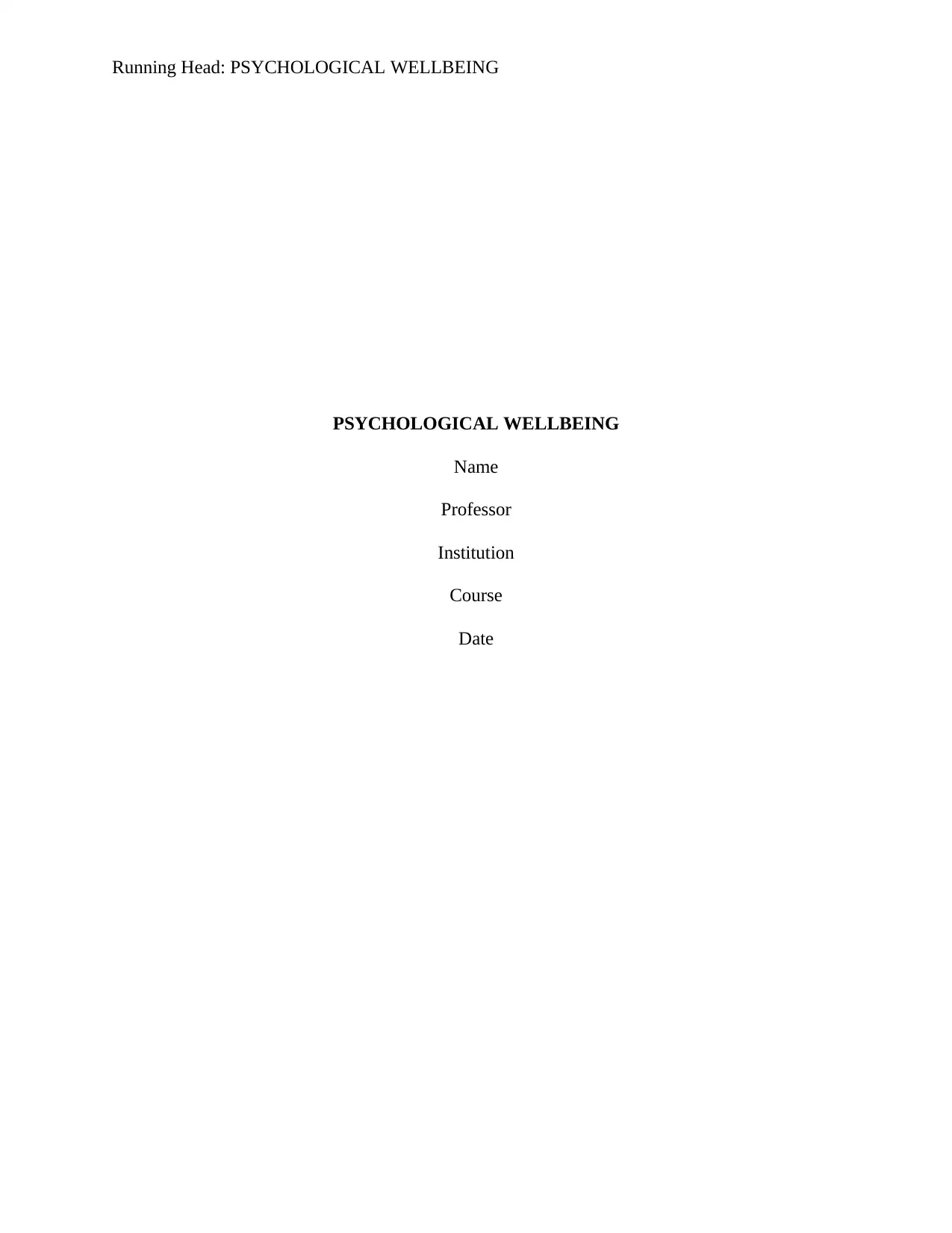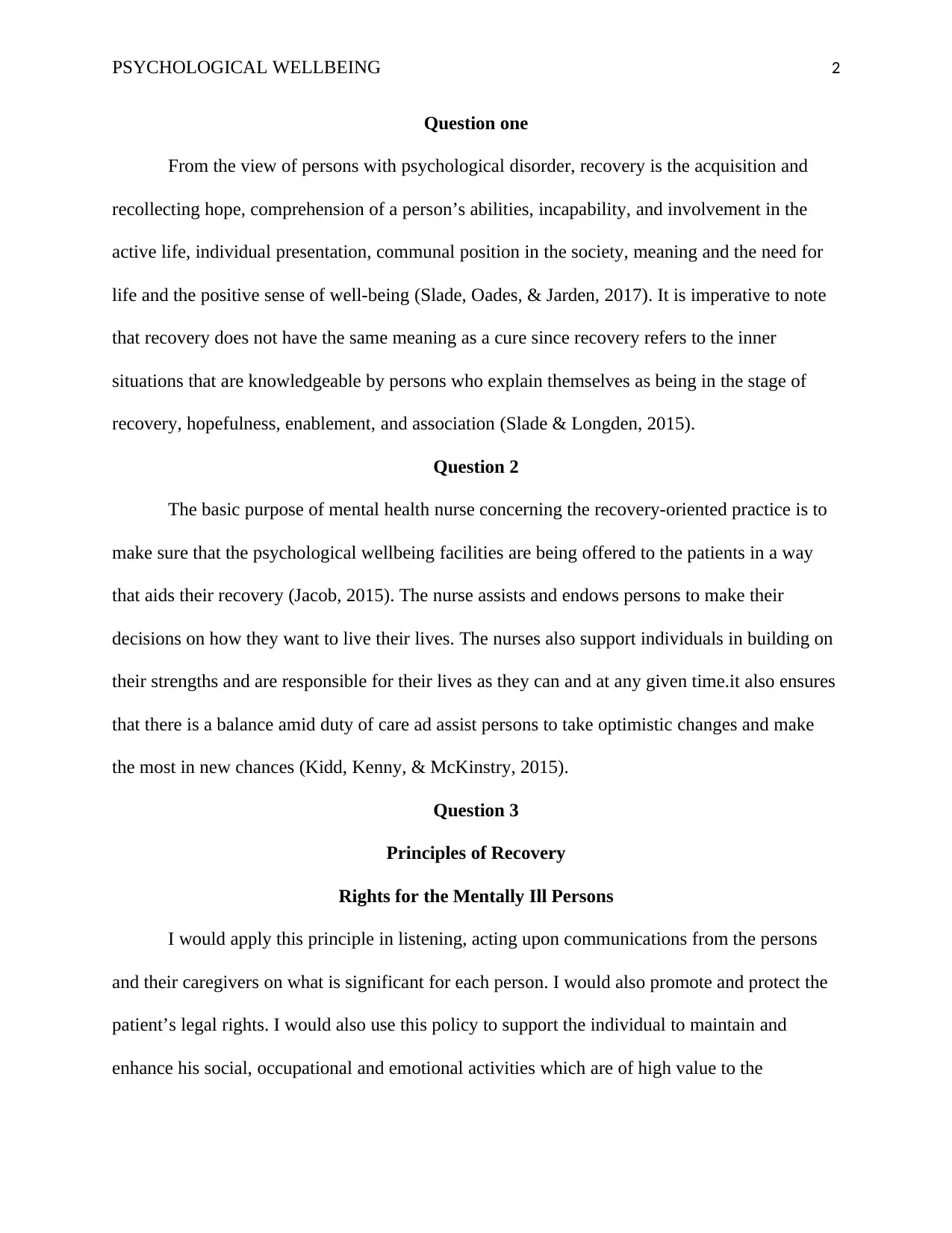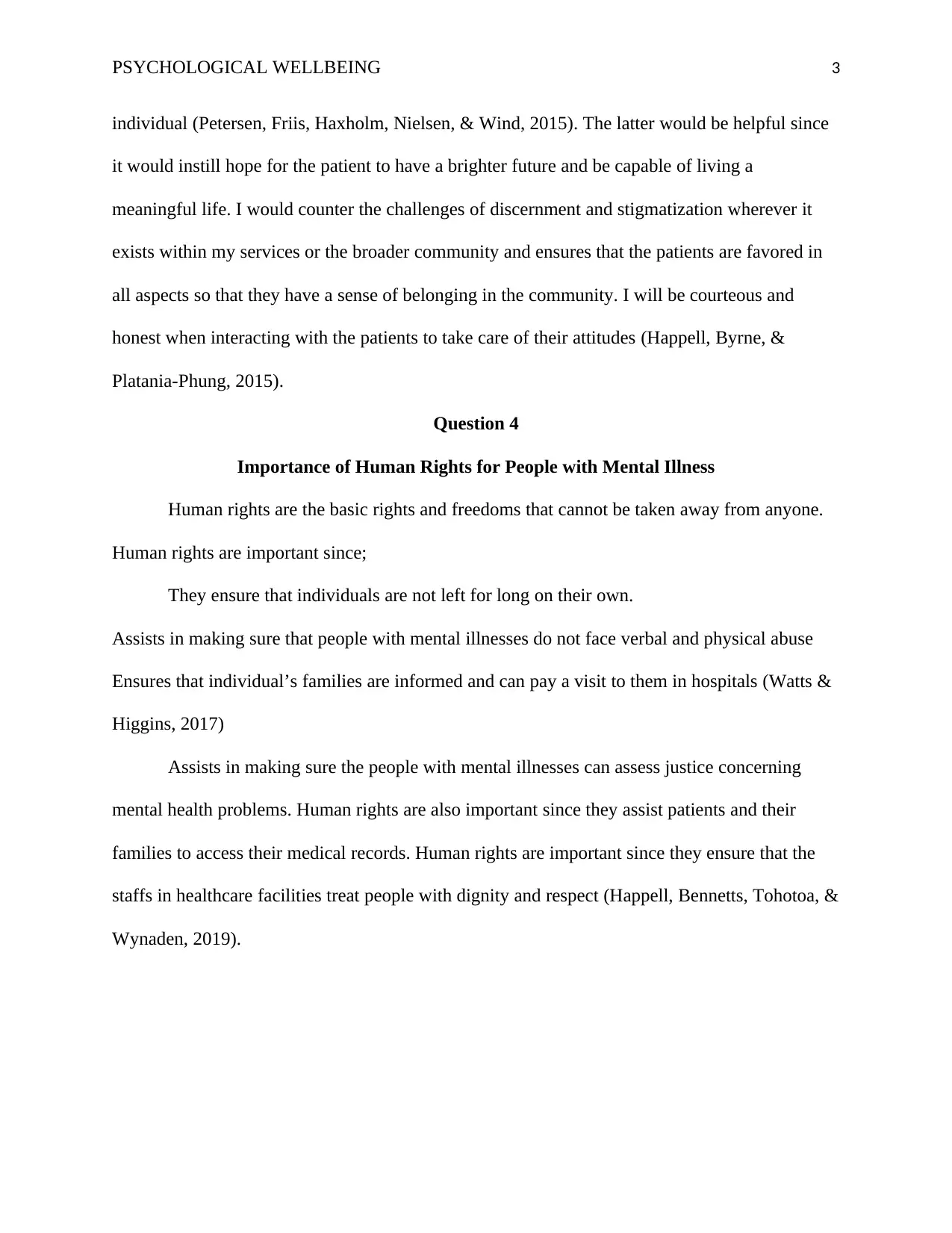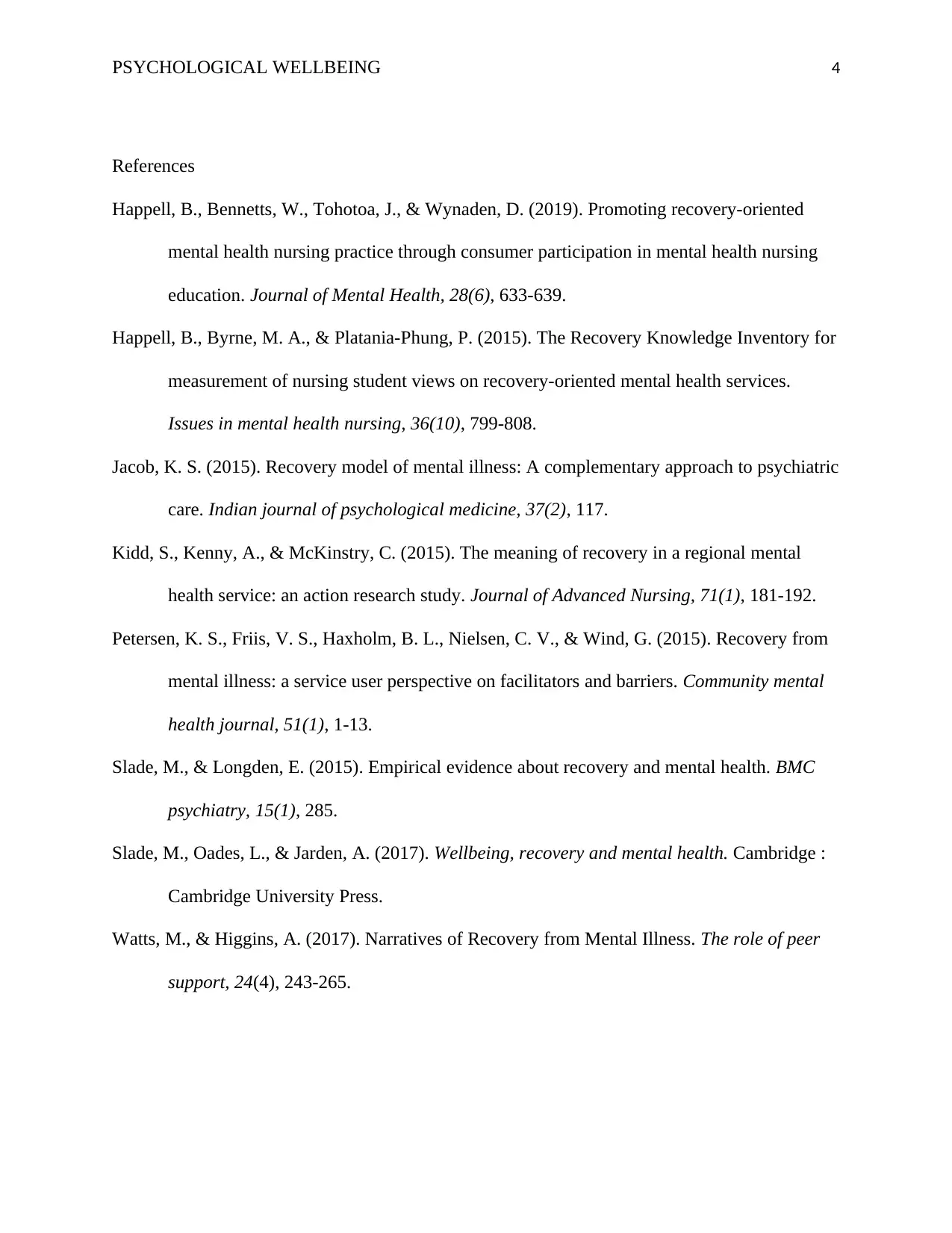Mental Health Recovery: Psychological Wellbeing Assignment (APA)
VerifiedAdded on 2022/09/25
|4
|918
|23
Essay
AI Summary
This essay explores the concept of psychological wellbeing within the context of mental health recovery. It begins by defining recovery from the perspective of individuals with psychological disorders, emphasizing hope, empowerment, and community involvement. The essay then examines the role of a mental health nurse in recovery-oriented practice, highlighting the importance of patient autonomy and strength-based care. It proceeds to analyze the application of specific recovery principles, such as promoting patient rights and fostering a sense of belonging. The essay concludes by emphasizing the significance of human rights for individuals with mental illnesses, including protection from abuse, access to information, and respectful treatment within healthcare settings. The assignment adheres to APA formatting and referencing guidelines.

Running Head: PSYCHOLOGICAL WELLBEING
PSYCHOLOGICAL WELLBEING
Name
Professor
Institution
Course
Date
PSYCHOLOGICAL WELLBEING
Name
Professor
Institution
Course
Date
Paraphrase This Document
Need a fresh take? Get an instant paraphrase of this document with our AI Paraphraser

PSYCHOLOGICAL WELLBEING 2
Question one
From the view of persons with psychological disorder, recovery is the acquisition and
recollecting hope, comprehension of a person’s abilities, incapability, and involvement in the
active life, individual presentation, communal position in the society, meaning and the need for
life and the positive sense of well-being (Slade, Oades, & Jarden, 2017). It is imperative to note
that recovery does not have the same meaning as a cure since recovery refers to the inner
situations that are knowledgeable by persons who explain themselves as being in the stage of
recovery, hopefulness, enablement, and association (Slade & Longden, 2015).
Question 2
The basic purpose of mental health nurse concerning the recovery-oriented practice is to
make sure that the psychological wellbeing facilities are being offered to the patients in a way
that aids their recovery (Jacob, 2015). The nurse assists and endows persons to make their
decisions on how they want to live their lives. The nurses also support individuals in building on
their strengths and are responsible for their lives as they can and at any given time.it also ensures
that there is a balance amid duty of care ad assist persons to take optimistic changes and make
the most in new chances (Kidd, Kenny, & McKinstry, 2015).
Question 3
Principles of Recovery
Rights for the Mentally Ill Persons
I would apply this principle in listening, acting upon communications from the persons
and their caregivers on what is significant for each person. I would also promote and protect the
patient’s legal rights. I would also use this policy to support the individual to maintain and
enhance his social, occupational and emotional activities which are of high value to the
Question one
From the view of persons with psychological disorder, recovery is the acquisition and
recollecting hope, comprehension of a person’s abilities, incapability, and involvement in the
active life, individual presentation, communal position in the society, meaning and the need for
life and the positive sense of well-being (Slade, Oades, & Jarden, 2017). It is imperative to note
that recovery does not have the same meaning as a cure since recovery refers to the inner
situations that are knowledgeable by persons who explain themselves as being in the stage of
recovery, hopefulness, enablement, and association (Slade & Longden, 2015).
Question 2
The basic purpose of mental health nurse concerning the recovery-oriented practice is to
make sure that the psychological wellbeing facilities are being offered to the patients in a way
that aids their recovery (Jacob, 2015). The nurse assists and endows persons to make their
decisions on how they want to live their lives. The nurses also support individuals in building on
their strengths and are responsible for their lives as they can and at any given time.it also ensures
that there is a balance amid duty of care ad assist persons to take optimistic changes and make
the most in new chances (Kidd, Kenny, & McKinstry, 2015).
Question 3
Principles of Recovery
Rights for the Mentally Ill Persons
I would apply this principle in listening, acting upon communications from the persons
and their caregivers on what is significant for each person. I would also promote and protect the
patient’s legal rights. I would also use this policy to support the individual to maintain and
enhance his social, occupational and emotional activities which are of high value to the

PSYCHOLOGICAL WELLBEING 3
individual (Petersen, Friis, Haxholm, Nielsen, & Wind, 2015). The latter would be helpful since
it would instill hope for the patient to have a brighter future and be capable of living a
meaningful life. I would counter the challenges of discernment and stigmatization wherever it
exists within my services or the broader community and ensures that the patients are favored in
all aspects so that they have a sense of belonging in the community. I will be courteous and
honest when interacting with the patients to take care of their attitudes (Happell, Byrne, &
Platania-Phung, 2015).
Question 4
Importance of Human Rights for People with Mental Illness
Human rights are the basic rights and freedoms that cannot be taken away from anyone.
Human rights are important since;
They ensure that individuals are not left for long on their own.
Assists in making sure that people with mental illnesses do not face verbal and physical abuse
Ensures that individual’s families are informed and can pay a visit to them in hospitals (Watts &
Higgins, 2017)
Assists in making sure the people with mental illnesses can assess justice concerning
mental health problems. Human rights are also important since they assist patients and their
families to access their medical records. Human rights are important since they ensure that the
staffs in healthcare facilities treat people with dignity and respect (Happell, Bennetts, Tohotoa, &
Wynaden, 2019).
individual (Petersen, Friis, Haxholm, Nielsen, & Wind, 2015). The latter would be helpful since
it would instill hope for the patient to have a brighter future and be capable of living a
meaningful life. I would counter the challenges of discernment and stigmatization wherever it
exists within my services or the broader community and ensures that the patients are favored in
all aspects so that they have a sense of belonging in the community. I will be courteous and
honest when interacting with the patients to take care of their attitudes (Happell, Byrne, &
Platania-Phung, 2015).
Question 4
Importance of Human Rights for People with Mental Illness
Human rights are the basic rights and freedoms that cannot be taken away from anyone.
Human rights are important since;
They ensure that individuals are not left for long on their own.
Assists in making sure that people with mental illnesses do not face verbal and physical abuse
Ensures that individual’s families are informed and can pay a visit to them in hospitals (Watts &
Higgins, 2017)
Assists in making sure the people with mental illnesses can assess justice concerning
mental health problems. Human rights are also important since they assist patients and their
families to access their medical records. Human rights are important since they ensure that the
staffs in healthcare facilities treat people with dignity and respect (Happell, Bennetts, Tohotoa, &
Wynaden, 2019).
⊘ This is a preview!⊘
Do you want full access?
Subscribe today to unlock all pages.

Trusted by 1+ million students worldwide

PSYCHOLOGICAL WELLBEING 4
References
Happell, B., Bennetts, W., Tohotoa, J., & Wynaden, D. (2019). Promoting recovery-oriented
mental health nursing practice through consumer participation in mental health nursing
education. Journal of Mental Health, 28(6), 633-639.
Happell, B., Byrne, M. A., & Platania-Phung, P. (2015). The Recovery Knowledge Inventory for
measurement of nursing student views on recovery-oriented mental health services.
Issues in mental health nursing, 36(10), 799-808.
Jacob, K. S. (2015). Recovery model of mental illness: A complementary approach to psychiatric
care. Indian journal of psychological medicine, 37(2), 117.
Kidd, S., Kenny, A., & McKinstry, C. (2015). The meaning of recovery in a regional mental
health service: an action research study. Journal of Advanced Nursing, 71(1), 181-192.
Petersen, K. S., Friis, V. S., Haxholm, B. L., Nielsen, C. V., & Wind, G. (2015). Recovery from
mental illness: a service user perspective on facilitators and barriers. Community mental
health journal, 51(1), 1-13.
Slade, M., & Longden, E. (2015). Empirical evidence about recovery and mental health. BMC
psychiatry, 15(1), 285.
Slade, M., Oades, L., & Jarden, A. (2017). Wellbeing, recovery and mental health. Cambridge :
Cambridge University Press.
Watts, M., & Higgins, A. (2017). Narratives of Recovery from Mental Illness. The role of peer
support, 24(4), 243-265.
References
Happell, B., Bennetts, W., Tohotoa, J., & Wynaden, D. (2019). Promoting recovery-oriented
mental health nursing practice through consumer participation in mental health nursing
education. Journal of Mental Health, 28(6), 633-639.
Happell, B., Byrne, M. A., & Platania-Phung, P. (2015). The Recovery Knowledge Inventory for
measurement of nursing student views on recovery-oriented mental health services.
Issues in mental health nursing, 36(10), 799-808.
Jacob, K. S. (2015). Recovery model of mental illness: A complementary approach to psychiatric
care. Indian journal of psychological medicine, 37(2), 117.
Kidd, S., Kenny, A., & McKinstry, C. (2015). The meaning of recovery in a regional mental
health service: an action research study. Journal of Advanced Nursing, 71(1), 181-192.
Petersen, K. S., Friis, V. S., Haxholm, B. L., Nielsen, C. V., & Wind, G. (2015). Recovery from
mental illness: a service user perspective on facilitators and barriers. Community mental
health journal, 51(1), 1-13.
Slade, M., & Longden, E. (2015). Empirical evidence about recovery and mental health. BMC
psychiatry, 15(1), 285.
Slade, M., Oades, L., & Jarden, A. (2017). Wellbeing, recovery and mental health. Cambridge :
Cambridge University Press.
Watts, M., & Higgins, A. (2017). Narratives of Recovery from Mental Illness. The role of peer
support, 24(4), 243-265.
1 out of 4
Related Documents
Your All-in-One AI-Powered Toolkit for Academic Success.
+13062052269
info@desklib.com
Available 24*7 on WhatsApp / Email
![[object Object]](/_next/static/media/star-bottom.7253800d.svg)
Unlock your academic potential
Copyright © 2020–2026 A2Z Services. All Rights Reserved. Developed and managed by ZUCOL.





